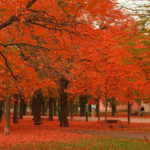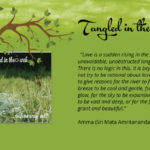When we became guardians of this piece of property, we named it Dharmagiri. Dharmagiri is a Sanskrit word. Giri means mountain and Dharma signifies the totality of the cosmos, including mind and matter, spirit and form. It encompasses the natural order of things and is also used to denote the formal teachings that lead onwards to awakening. Dharmagiri could also be translated as Sacred Mountain. I think at first we were drawn to this name because of the power of the mountain, its strength and apparent benevolence, and because of our intention to dedicate our time here in devotion to the quest of enlightenment.
I’ve often wondered what makes a mountain sacred. Is it the miracles that seem to happen there, the special experiences, the blessings that its presence bestows on all who come into her aura? Many times I’ve noticed that in the process of walking up the mountain, I find myself present, here in this moment. Naturally I come into contact with my body, following each step in between the boulders, alert to the terrain, aware of my breath and weight as I negotiate with the formidable force of gravity. As I look down and see the tiny boxes we inhabit, I realize we often get entangled in the myriad complications of this and that, good and bad, should and shouldn’t, and lose perspective on our essential spaciousness of spirit. Somehow in the process of simply climbing up the mountain, I get realigned, connected to the reality of the moment, rather than lost in judgments about how it is or should be. The thoughts that tripped me up below still appear, but somehow they are seen for what they are. When we’re in touch with the true nature of a moment, we see the Dharma and experience the essential beauty of life.
Perhaps a place is sacred when it helps us to trust that it’s OK and important to be here, to be fully here so that we can discover our inherent peacefulness and sanity. They say these mountains are 220 million years old. That’s a long time. And yet the thought of tomorrow can sometimes send us into a spin. As I open my eyes and sense how fleeting our human presence is here, reflecting on the immensity and timelessness of this mountain, I find a moment of humility. What delusion to really imagine I own this body, this land, these things.
From a Buddhist perspective the sense of ownership is a false assumption that gives rise to endless suffering. We think we can find security in possessing or identifying with something, and yet whatever we grasp slips through our fingers. Not realizing the changing nature of things, we continually feel let down. Our teacher used to tell us that our suffering was like a person upset with a chicken, demanding to know why it wasn’t a duck. Believing our judgments, expectations and demands about how things should be, we obstruct ourselves from accessing the true sacredness and blessedness of what is actually being offered in any given moment.
On a sacred mountain we didn’t expect to learn about firebreaks or invasive plants that were carelessly planted by settlers earlier this century leading to erosion of the land and depletion of the water resources. We didn’t imagine we would be spending so much time taking out gum and pine trees and rejoicing to see the indigenous shrubs and grasses return. We didn’t expect to meet a Zulu woman named Angel who was desperately seeking a refuge and a home, fleeing from political violence, trying to find education for her sons. I certainly didn’t expect on our sacred mountain to face someone trying to kill another, or imagine I would be sitting with a group of young men discussing violence and where it leads. I didn’t expect to see a young person we’d tutored get sick and find out he’s HIV positive, leading us into the monumental tragedy of AIDS. I never would have imagined that this magic mountain would one day bring down its steep slopes a tiny puppy. Separated from an illegal hunting party, Jack found his way to us with a loving, loyal, and fearless heart that has melted our deepest moments of despair. All these circumstances could be seen as unwanted problems. In truly receiving what is being offered, however, we can respond with an undivided heart, allowing manifold blessings to emerge in most unexpected ways.
Buddhism teaches that a great source of joy is giving. Since it is said that the cause of suffering emerges from trying to keep and possess what is not really ours, we discover joy and a sense of communion with all things when we share. As I look to the future of this country I see that we need to abandon our preoccupation with selfish expectations, and rather cultivate a culture of sharing. After all, as Africa frequently reminds us, none of us are here for very long.
Therefore, the wind does thus when we die, the wind makes dust, because it intends to
blow, taking away our footprints with which we had walked about while we still had nothing the matter; and our footprints, which the wind intends to blow away, would otherwise still show. For it would seem as if we still lived. Therefore, the wind intends to blow, taking away our footprints.
Dia!kwain (from the Bushman Xam tribe that is now extinct)
Article from ‘Resurgance’ by Kittisaro
September 29, 2010 by Thanissara Categories: Articles | Leave a comment








